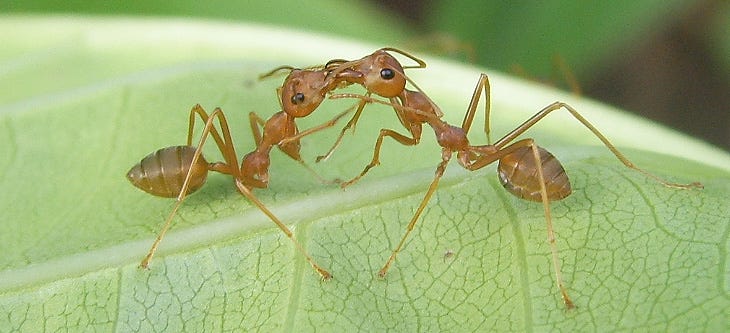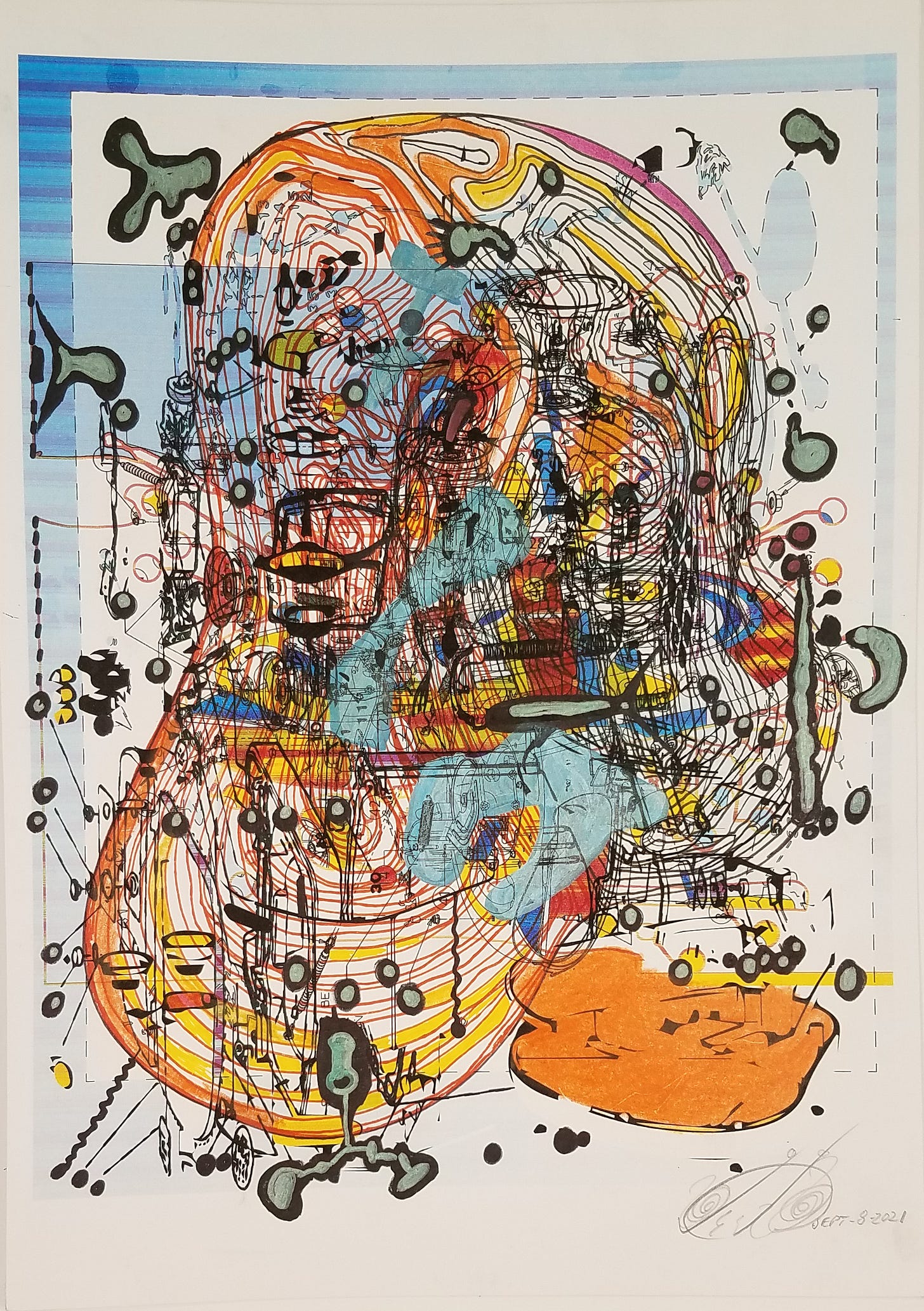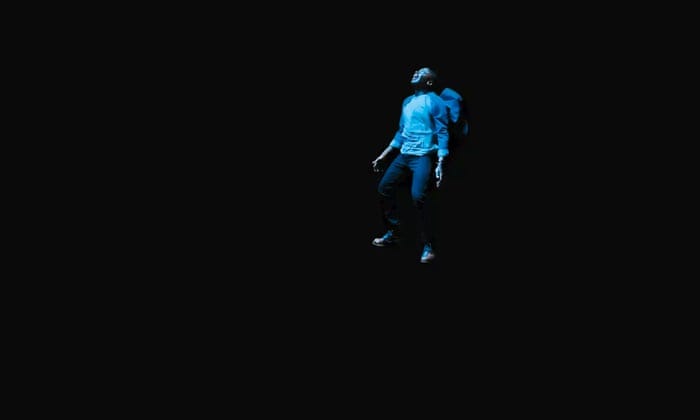You are parasitising your body: exploring the idea that self is an informational symbiont of Homo sapiens.
Symbiosis Saturday
Symbiosis Saturday
Hi there, welcome to Engineering Our Social Vehicles. If you’re new to the newsletter, today is Symbiosis Saturday. On Saturdays around these parts, we like to chat about wacky ways species are getting along with one another. Today we’re going to talk about Homo Sapiens and “self”.
Socially Seeding Symbionts

Many insects have cospeciated endosymbionts- a fancy way of saying they have organisms, often bacteria, that live inside them. Those bacteria species and their insect hosts have evolved to depend on one another over millennia. How do those bacteria get into the insect in the first place, though? Some insect mothers seed their offspring with their endosymbionts using specialized vessel cells known as bacteriocytes. Others pass on their attendant species in milk.
None are as fascinating to me as termites, who spread their attendant species via trophallaxis, or “social feeding”. The reason termites are of special interest is because they are a social insect. Trophallaxis forms the backbone of food sharing in many colony species. Without it, termites in particular wouldn’t be infected with the endosymbiont that allows them to digest cellulose and eat wood. It’s funny to think that the action we know termites best for is actually done for them by unicellular organisms in their gut. A termite that is never exposed to the hive won’t be able to digest wood- it would be feral.
Feral Children
Feral Children are a terrifying window into the work of nature without the meddling of nurture. The study linked here is a a review and analysis of 46 “feral” children, divided into four categories:
animal-reared child
those raised in isolation away from society
those confined in isolation
those confined with limited human contact
The paper discusses muteness as one of the marks of a feral child. 36 of 46 children in the study linked were without language whatsoever, and 35 of those were unable to recover it to a level that isn’t considered mentally impaired. The study uses the 36th child to dismiss the hypothesis that there is a vital period of language formation which, once missed, cannot be re-attained. I’m not totally convinced that #36 - Kasper Hauser- isn’t an outlier that himself can be dismissed, since he eventually worked as a law clerk despite a mental age of three and a physical age of 17 on discovery (upon which he could only speak 3 phrases). The paper uses Kasper and a few other choice cases as examples of the pivotal role of a stable environment in differentiating some feral children from others.
The feral or the wild child is temporarily lost from society; the emotionally isolated child remains permanently lost to himself.
The especially unfortunate children that were both isolated and mistreated showed little advancement when finally discovered and cared for.
The energy they could have used for learning was spent on the task of anticipation.
Despite being totally deprived of all human interaction, Kasper was taken care of, had his nails trimmed and was bathed and fed regularly - all while never seeing his caretaker’s face. Opiates were slipped into his water when he required close-up cleaning. Due to the consistent nature of his care, the paper argues, he didn’t need to devote energy to “anticipation,” and thus didn’t suffer the same complete irrecoverability as most every other child mentioned.
Disclaimer (Language): I’m going to use the word “ensouled” to describe the process by which society rubs off on a human to nurture them to full social function. I’m in no way saying feral children don’t have souls, simply saying this process hasn’t happened for them.
Feral children allow us a view into what happens when a body is born but not ensouled by society. The children who were not contained, however, displayed ingenuity- they were able to hunt and survive in wild environs with little to no preparation. They still showed mind. Just not the mind we think of as civilized.
Id
Without endorsing any of Freud’s theories, I’d like raise id, ego, and superego as relevant at this time in the article. If you’re unfamiliar, Freud proposed a tripartite separation of the mind into the instinctual Id, the subconscious socially imprinted Superego, and the conscious agent Ego.
The level of consciousness most feral children display is often described as instinctual. Without language or a socially imprinted set of values, the ego seems dominated by Id. As Freud argued, the superego mediates our baser desires and temper our thoughts- creating a stronger ego through the push and pull of what he thought of as opposing forces.
This paper partially explores the Kasper Hauser through the lense of Freud, looking at the boy’s asexuality as evidence of a not-fully-developed ego. It’s mostly affectatious navel gazing, but there are some interesting insights to be had:
Therefore, the degenerate, the perpetual child, may be distinguished by his excessive sensibility, living life at too great a peak of intensity. (…) In "Civilized" Sexual Morality (1908), Freud probably has this in mind when he describes how the instinctual child, and the adult too unyielding to suppress his childhood instincts 326 come to be called a "criminal", or an "outlaw" (Freud, 1959: 187). Certainly there are indications that in "Analysis of a Phobia in a Five-Year-Old Boy" ("Little Hans") Freud wished to protect the polymorphously perverse child from charges of degeneracy
I think Freud was onto something here, but a little off. Rather than three parts of the same mind I believe there may be multiple intersecting minds which we subjective experience as a single one. If we look at feral children we see almost all id, an organism impossible to compel into action via complex communication.
When a rat is infected with toxoplasmosis, or when an ant is zombified, a parasite hijacks the host nervous system to force it to behave in ways that will damage the host but advantage the parasite. You could not give a feral human a gun and expected them to go to war- they would be unable to comprehend what you even wanted. An ensouled human, however, will march bravely to their death in the name of an idea.
The Sunken Place
If you’ve seen Jordan Peele’s horror masterpiece Get Out, you’re familiar with the concept of “the sunken place.” It’s a part of your mind where you’re forced to watch as a passive observer as another controls your body. For myself and many others this was the most terrifying parts of Get Out: a complete loss of agency without losing consciousness.
Id is the base-model biological wetware screaming out from the sunken place- the parasitized ant grasping for control, the confused rat running towards a cat it suddenly finds irresistible. Ego, consciousness, self- is a parasite on base human biology. You are separate from your instincts not because you are highly evolved enough to resist them, but because you are of a different species. Your existence is the thing driving them from the body’s control panel in the first place.
So who— what— are you?
Seeding Self
Humans are thinkers. It’s what we do best, what we’re “known” for. Feral children are biologically children, but don’t display the outward traits we’d associate with human thought- rather at best they show thought on par with the severely mentally impaired, or with other intelligent primates. Only when they are exposed to society, reintroduced to the hive, do they begin to ensoul.
What if abstract thought is to humans as eating wood is to termites? What if it isn’t us that think, but an accessory species—a symbiont?
Humans are ensouled via language and information. It’s possible to think without using language, but language is “crucial for acquiring enough information to properly set up various cognitive domains.” Communication is our trophallaxis- it is the social action by which we infect one another with the necessary symbiont for self.
You have four parents. You have your biological mother, and your biological father- they conceived your body. You have your social father, you social mother- they conceived your soul. You are informational life. You live only in the arrangement of information in your body’s brain.
You are not your body. You ride it like a fungus pod rides an ant to the top of a stalk of grass. You are the complex web of information that was imprinted on you by your social mother, father, and society writ large. Without that information, you wouldn’t exist. Only your body.
Counterargument, WTF
This is an imperfect metaphor. Informational life- what you are- isn’t constrained by the rules of sexual reproduction. There’s also a bigger, uglier parent that is likely more influential than your social parents combined: the hive. Society likely represents another “mind” that underpins your sense of self, a la superego. Only I still believe Freud got it wrong- that superego is an outcropping of another organism that isn’t you. If we re-imagine the Id, Ego, Superego model in the vein of informational parasites- it looks like Host, Parasite, Hive.
The biggest flaw in the above argument is the suggestion of informational life. It’s a massive concession to accept the existence of an organism that we can’t demonstrate physical evidence for. That’s the rock that sank the S.S. Memetic. As this gets into metaphysics and the ability to reason about space beyond the real, it’s extremely easy to consign this theory to quackery. I’ll have more arguments in the future for informational organisms, but for now I’ll say that if you can’t conceive of information influencing biology, then this theory isn’t for you.
The second biggest flaw is that feral children likely still have sense of self and agency, and I’m likely aggrandizing the consciousness we do experience. I think there’s still a LOT of meat on the bone of a biological human being deficient if not raised socially. This remains fertile conversational soil, even if I’m blowing things way out of proportion.
Finally, this is my first pass at putting to paper what is essentially my most out-there idea. WTF is merited.
Conclusion
You aren’t your body- you’re an arrangement of information that bosses it around. You’ve consigned your body’s mind, what Freud would call your id, to the sunken place.
As always, let me know what you think in the comments and on twitter.









This concept at the end reminds me quite a bit of the "Memespace Egregores" talked about over on the Substack "Handwaving Freakoutery". The idea that ideas can be treated as their own organisms, complete with reproduction and competition selection. Ideas can literally ride us into battle, and wage war with other ideas, using our bodies, and weapons forged with the help of other idea parasites.
I love the biological metaphor.
It reminds of Parmenides idea of 'Way of Truth' vs 'Way of Opinion'. He describes the Way of Truth as the real world, absolute and timeless, where everything is known and happening at the same time. This Way of Truth is unfortunately forever inaccessible to us, as we are trapped in the Way of Opinion. This Way of Opinion is the subjective, time-framed experience of world. It is constructed by the social hive and the environment we live in. This makes a distinction between the divine self and the mortal self (very popular theme at the time) but it does not make a distinction between the physical and the consciousness.
To do this, I personally like to use the Way of the Word. Whenever we think about anything using words, we *must* construct the universe in our mind in the Way of the Word. Also, because consciousness is an agent of the Word, it stems from the Way of Word. Everything we think is forever a subject in the Way of Word.
Do we experience the real world, or are we just experiencing a second-hand result of it? I believe we do experience it, however not in the Way of the Word. We experience it directly, instantaneously, at all times through Sensations. Feelings senses and actions are how we experience the real world. Whenever we start thinking consciously about those sensations, we summon the Way of the Word to take into its gaze the infinitely complex series of input that storm us on every instant, so we can reason about it.
I don't agree that the Way of the Word has any control over the real us. It can help us see and measure differently what is good for us, but it remains an abstraction. Consciousness is but a tool we use, and like all tools, it must be shaped and used by something else.
In the case of the feral child, its mind has not been shaped to form consciousness in the Way of the Word. It was shaped by its environment in order to better survive it. We can still interact with the feral child by means of the real world, the same we do with animals: sensations, empathy and action.
There are a lot of interesting ideas that are coming out of modern neuroscience as well. A self-propagating information system that evolved alongside the physical homo sapiens is not that far fetched.